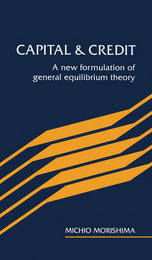
|
Capital and Credit: A New Formulation of General Equilibrium Theory
Hardback
Main Details
| Title |
Capital and Credit: A New Formulation of General Equilibrium Theory
|
| Authors and Contributors |
By (author) Michio Morishima
|
| Physical Properties |
| Format:Hardback | | Pages:226 | | Dimensions(mm): Height 229,Width 152 |
|
| Category/Genre | Economic theory and philosophy
Macroeconomics |
|---|
| ISBN/Barcode |
9780521418409
|
| Classifications | Dewey:339.5 |
|---|
| Audience | | Professional & Vocational | |
|---|
|
Publishing Details |
| Publisher |
Cambridge University Press
|
| Imprint |
Cambridge University Press
|
| Publication Date |
8 October 1992 |
| Publication Country |
United Kingdom
|
Description
Contemporary general equilibrium theory is characteristically short-run, separated from monetary aspects of the economy, and as such does not deal with long-run problems such as capital accumulation, innovation, and the historical movement of the economy. These phenomena are discussed by growth theory, which assumes a given or shifting production function, and in turn cannot therefore deal with the fundamental problem of growth, namely how the production function is derived. Thus traditional theories have a common weakness in that they divorce real economic growth from the activities of the financial sector. This book provides a much-needed synthesis of growth theory and monetary theory. Professor Morishima draws on the work of Schumpeter, Keynes and the pre-war neoclassical economists to formulate a capital-theoretic general equilibrium theory.
Reviews"Capital and Credit is a noble book. At the end of his seventh decade, Michio Morishima has looked back over his life's work which, in a sense, has been preparation for writing this book...Sometimes quirky but always deep, Capital and Credit is a fascinating book which blends sociological and historical insights with formal analysis...The presentation of the argument, and the numbered paragraphs brought back to me the excitement I first experienced as an undergraduate when I read Value and Captial and which I still experiences when I read ^A Market Theory of Money. Morishima is a latter day Moses. He may not enter the promised land himself...but he has provided the leadership and where-with-all for his followers to enter it and come into a rich inheritance." G.C. Harcourt in Journal of Economic Literature
|